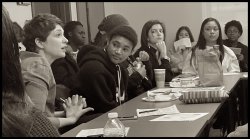April 11, 2024
Fall and Summer 2024 Philosophy Course Offerings
Posted in: News

REGISTRATION FOR FALL BEGINS FRIDAY, APRIL 5 via Nest
The following course descriptions are provided on an informal basis to provide more detail about course content. Please be sure to verify details in the official schedule.
- PHIL 105 Happiness and Meaning in Life
- Staff/TBA
- MR 0945-1100
- crn 46083
- (Other sections currently reserved for incoming freshman students; seats may become available later in summer)
- Description: The first part of this course considers different conceptions of happiness (aka well-being) by critically examining ancient and contemporary theories of happiness such as hedonism, desire satisfaction theory, and objective theories of human welfare. By studying this material we learn that being happy does not necessarily entail living a meaningful life. The second part of the course explores the differences between happiness and meaning in life by examining contemporary theories of meaning in life, such as Richard Taylor’s subjectivist theory and Susan Wolf’s fitting fulfillment theory.
- PHIL 212 Social & Political Philosophy
- Megan Robison
- W 1045-1315
- (no crn assigned yet)
- Description: The political realm seems to have expanded into almost every domain of human life. But, what, we might ask, is politics? What distinguishes the political realm from other domains of life? Should the political realm be distinct from other spheres? In this course, we will go back to the basics and explore various conceptions of politics by engaging ideas of some of the most influential figures in the western philosophical tradition including Plato, Aristotle, Augustine, Hobbes, Rousseau and Arendt.
- (This course counts toward the Values requirement in the philosophy major, and counts in the Philosophy Minor.)
- PHIL 214 Ethics of Love, Sex, and Desire
- Staff/TBA
- TF 0945-1100
- crn 46087
- Description: An exploration of the ethical issues related to human sexuality and/or intimate relationships. The focus in this course is on conflicts and/or problem areas related to love, sex and desire and the ways ethicists address them. Ethical issues to be discussed include: monogamy, promiscuity, gay marriage, abstinence education, transgender identity, pornography, prostitution, and sexual abuse.
- (Course counts for the Philosophy major Values requirement, and the Philosophy minor.)
- Phil 288 Introduction to Cognitive Science
- W 0800-1030 (Julian David-Drori) crns 46414, 46359, 44157
- TF 0945-1100 (Staff/TBA) crns 46358, 46088, 46412
- MR 1415-1530 (Lauren Covey) crns 45847, 46395, 43802
- Description: An introduction to the multidisciplinary field of cognitive science. Topics include: the mind-body problem, thought as computation and the computer model of the mind, the role of representation in mental activity. Emphasis will be upon the methodological approaches found in artificial intelligence, cognitive psychology, cognitive anthropology, cognitive neuroscience, linguistics, and philosophy.
- (This course serves as an Elective in the philosophy major, satisfies the 288 requirement in the Cognitive Science minor, and counts toward the philosophy minor. Each class is crosslisted under PHIL, LNGN, and PSYC so has 3 crns each; there is no difference between those sub-sections.)
- PHIL 290 Philosophy of Mental Health
- Jon Morgan
- MR 1415-1530
- crn 46089
- Description: A variety of metrics suggest that mental health is on the decline in the United States. Naturally, we’d like to know how to reverse this trend and aid those struggling with, among other things, mental illnesses and mental health disabilities. Yet when we sit down and think about possible solutions, a tricky question quickly arises: How should we define, understand, and conceptualize mental health? This is not an easy question. But an answer is indispensable. It’s hard to know how to improve mental health if we don’t have an understanding of what exactly mental health is in the first place. The good news: This is the sort of conceptual question that the critical tools of philosophy are designed to answer. In this course, we’ll put these philosophical tools to use and try to better our understanding of both mental health and mental illnesses.
- (This course counts towards the Knowledge & Reality requirement of the Philosophy major, and for the Philosophy and/or Cognitive Science minors.)
- PHIL 291 Cognitive Neuroscience of Neurodiversity and Disability
- Julian David-Drori
- W 1045-1315
- crn 44826
- Description: Neurodevelopmental Disabilities such as ADHD, autism and learning disabilities are becoming increasingly areas of interest. In this course, students would look at these disorders from multiple perspectives. Students will learn about the neurocognitive correlate of these disorders, discuss philosophical impacts and structures, as well as learn about advancements in this field, and gain a better understanding of neurodiversity as a whole. (Though not an official pre-requisite, highly recommended that students have taken PHIL/PSYC/LNGN 288.)
- (Course will count for Philosophy major elective, Philosophy minor, and Cognitive Science minor.)
- PHIL 292 Philosophy of Race
- Staff/TBA
- MR 1545-1700
- crn 46090
- Description: The aim of this course is to cover the major debates and areas of inquiry in philosophy of race. Some of the debates concern whether race is real; whether, if so, it is socially real, biologically real or psychologically real; whether society should abolish the use of the idea or category of race because of its relation to racism and racial injustice; how race can affect the flow of knowledge in society, the production of ignorance and the justification of individually held beliefs; and how race affects the distribution of wealth and opportunities in the United States. These debates and areas of inquiry in the philosophy of race will be taken up by engaging not only with philosophers of race but also with philosophers of biology, sociologists, metaphysicians, epistemologists, and political philosophers.
- (Course will count for Philosophy major elective, and Philosophy minor.)
- PHIL 297 Meaning in Life
- Tiger Roholt
- T 1430-1700
- crn 46091
- Description: We want our lives to go well. We want to be satisfied, content, happy. Philosophers refer to this as well-being. But we also want to live meaningful lives. What does it mean for a life to be meaningful? Meaningfulness is related to but different from well-being. Meaningfulness is also related to but different from morality. Rather than asking what makes life meaningful, it may be more manageable to ask what makes certain activities or projects meaningful. If we can answer this last question, then we can make sense of how to get meaning into our lives. Although philosophers have been writing about these issues for centuries, it is only in the last twenty years or so that a subfield has taken shape in mainstream, analytic philosophy that is focused explicitly on meaningfulness. In this course, we will study this new philosophy, and we will also trace connections to the tradition (including the continental tradition). We will read philosophers such as Susan Wolf, Thaddeus Metz, Iddo Landau, David Matheson, Robert Nozick, Richard Taylor, Charles Taylor, Albert Borgmann, and Hubert Dreyfus.
- (This course counts as a Values requirement for Philosophy majors, and will count for the Philosophy minor.)
- PHIL 390 Philosophy and Artificial Intelligence
- Unfortunately, this course cannot be offered and will be imminently removed from the registration listings.
